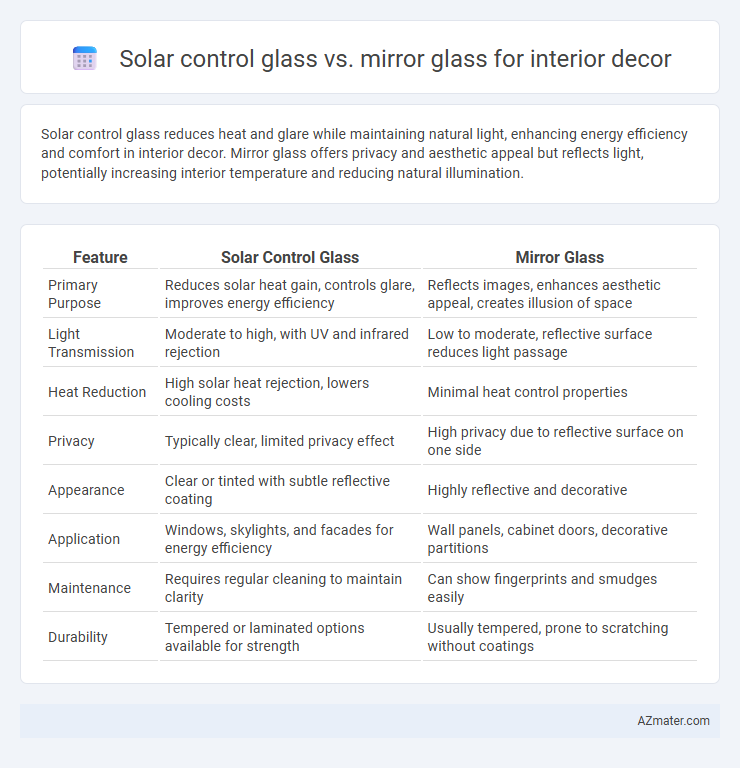Solar control glass reduces heat and glare while maintaining natural light, enhancing energy efficiency and comfort in interior decor. Mirror glass offers privacy and aesthetic appeal but reflects light, potentially increasing interior temperature and reducing natural illumination.
Table of Comparison
| Feature | Solar Control Glass | Mirror Glass |
|---|---|---|
| Primary Purpose | Reduces solar heat gain, controls glare, improves energy efficiency | Reflects images, enhances aesthetic appeal, creates illusion of space |
| Light Transmission | Moderate to high, with UV and infrared rejection | Low to moderate, reflective surface reduces light passage |
| Heat Reduction | High solar heat rejection, lowers cooling costs | Minimal heat control properties |
| Privacy | Typically clear, limited privacy effect | High privacy due to reflective surface on one side |
| Appearance | Clear or tinted with subtle reflective coating | Highly reflective and decorative |
| Application | Windows, skylights, and facades for energy efficiency | Wall panels, cabinet doors, decorative partitions |
| Maintenance | Requires regular cleaning to maintain clarity | Can show fingerprints and smudges easily |
| Durability | Tempered or laminated options available for strength | Usually tempered, prone to scratching without coatings |
Introduction: Solar Control Glass vs Mirror Glass in Interior Decor
Solar control glass enhances interior decor by reducing heat and glare while allowing natural light, promoting energy efficiency and comfort. Mirror glass adds aesthetic appeal through reflective surfaces that create spaciousness and depth but offers limited thermal insulation. Choosing between solar control and mirror glass depends on balancing energy performance with design preferences in interior spaces.
Key Differences Between Solar Control Glass and Mirror Glass
Solar control glass reduces heat gain and blocks harmful UV rays while maintaining transparency, making it ideal for energy-efficient interiors. Mirror glass primarily reflects light and offers privacy by creating a one-way viewing effect, often used for decorative accents and privacy screens. Key differences include solar control glass's functionality in thermal management versus mirror glass's focus on reflection and aesthetic privacy in interior decor.
Aesthetic Appeal: Which Glass Enhances Interior Design?
Solar control glass enhances interior design by reducing glare and controlling heat without compromising natural light, creating a comfortable and visually appealing atmosphere. Mirror glass offers a bold aesthetic by reflecting surroundings and adding depth, making spaces appear larger and more dynamic. Choosing between solar control and mirror glass depends on the desired balance between light management and reflective impact in interior decor.
Light Management and Glare Reduction
Solar control glass effectively reduces solar heat gain while maintaining natural daylight, optimizing interior light management without compromising visibility. Mirror glass offers high glare reduction by reflecting light, creating privacy, and adding aesthetic appeal but may reduce the amount of natural light entering the space. Both options enhance interior decor by balancing light control and visual comfort, with solar control glass focusing on energy efficiency and mirror glass on reflective aesthetics.
Energy Efficiency and Thermal Comfort
Solar control glass significantly enhances energy efficiency by reducing solar heat gain while allowing natural light to pass through, lowering cooling costs and improving thermal comfort indoors. Mirror glass, with its reflective surface, blocks sunlight and provides privacy but can increase interior heat if not properly coated, potentially reducing overall energy performance. Choosing solar control glass optimizes indoor climate regulation and decreases reliance on air conditioning, making it a superior choice for sustainable interior decor.
Privacy Considerations in Interior Spaces
Solar control glass enhances privacy by reducing glare and limiting visibility from outside while allowing natural light to enter interior spaces, making it ideal for daytime privacy without compromising brightness. Mirror glass offers a reflective surface that provides high privacy during daylight hours by creating a one-way mirror effect, but its effectiveness diminishes at night when interior lighting is stronger. Selecting between solar control glass and mirror glass depends on the desired balance between privacy, natural light transmission, and exterior visibility throughout different times of the day.
Durability and Maintenance Requirements
Solar control glass offers superior durability due to its advanced coating that resists scratches and reduces heat transfer, making it ideal for long-term interior applications. Mirror glass requires more frequent maintenance to prevent tarnishing and smudges, as its reflective surface is more susceptible to wear and corrosion. Choosing solar control glass minimizes upkeep while maintaining aesthetic appeal and functional performance in interior decor settings.
Cost Comparison: Installation and Long-Term Value
Solar control glass typically has a higher initial installation cost due to its advanced coating technology designed to reduce heat and UV transmission, making it an investment in energy efficiency and indoor comfort. Mirror glass often incurs lower upfront expenses but may contribute to higher long-term energy costs because it lacks solar heat rejection properties. Considering long-term value, solar control glass delivers better energy savings and durability, justifying its price compared to the more economical but less efficient mirror glass.
Best Applications for Solar Control Glass in Interiors
Solar control glass is ideal for interior spaces requiring reduced heat gain and enhanced energy efficiency, such as office buildings, residential living rooms, and conference rooms with large windows. It effectively minimizes glare and UV radiation, protecting furnishings and maintaining comfortable temperatures without compromising natural light. This glass type excels in environments where thermal comfort and sustainability are priorities, outperforming mirror glass, which is primarily decorative and less efficient at heat control.
Ideal Uses of Mirror Glass for Home and Office Decor
Mirror glass is ideal for home and office decor due to its ability to enhance space perception and increase natural light reflection, making rooms appear larger and brighter. It excels in creating stylish focal points such as decorative wall panels, mirrored closets, and conference room accents. Unlike solar control glass, mirror glass prioritizes aesthetic appeal and interior design versatility by adding depth and sophistication without reducing heat or UV exposure.

Infographic: Solar control glass vs Mirror glass for Interior decor
 azmater.com
azmater.com